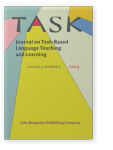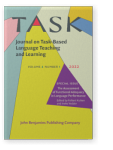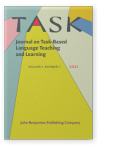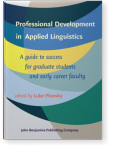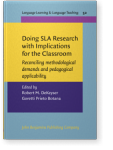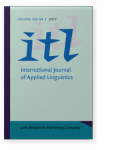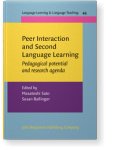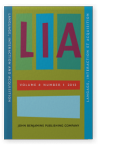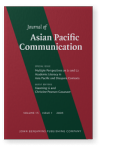Shawn Loewen
List of John Benjamins publications for which Shawn Loewen plays a role.
Journal
2022 Functional adequacy, task-based language teaching and instructed second language acquisition: A commentary The Assessment of Functional Adequacy in Language Performance: Special issue of the Journal on Task-Based Language Teaching and Learning 2:1 (2022), Kuiken, Folkert and Ineke Vedder (eds.), pp. 137–145 | Article
This commentary synthesizes the five articles in Kuiken and Vedder’s special issue on functional adequacy in linguistic performance. The commentary considers the different scales that were used to measure functional adequacy, as well as the relationship between functional adequacy and other… read more
2021 Exploring the relationship between TBLT and ISLA TASK 1:1, pp. 47–70 | Article
The relationship between task-based language teaching (TBLT) and instructed second language acquisition (ISLA) is a close one. Both are concerned primarily with facilitating the development of second language (L2) learners’ linguistic proficiency. This article begins by providing a brief… read more
2020 Chapter 5. Towards achieving work-life balance in academia: Comments and personal essays from six applied linguists Professional Development in Applied Linguistics: A guide to success for graduate students and early career faculty, Plonsky, Luke (ed.), pp. 49–64 | Chapter
The competing demands of teaching, research, and service seem to never end. Consequently, as academics, we often find ourselves feeling unable to realize our professional goals while also maintaining a life outside of work. Recognizing that there is no one-size-fits-all way to achieve or… read more
2019 Chapter 3. Methodological strengths, challenges, and joys of classroom-based quasi-experimental research: Metacognitive instruction and corrective feedback Doing SLA Research with Implications for the Classroom: Reconciling methodological demands and pedagogical applicability, DeKeyser, Robert M. and Goretti Prieto Botana (eds.), pp. 31–54 | Chapter
This chapter reports on a classroom-based quasi-experimental study by focusing on its methodological aspects. The study’s objectives were twofold: (1) to examine the effect of metacognitive instruction (MI) in which learners were instructed about the benefits of receiving corrective feedback (CF),… read more
2017 The development of statistical literacy in applied linguistics graduate students ITL - International Journal of Applied Linguistics 168:1, pp. 4–32 | Article
Statistics play an important role in analyzing data in applied linguistics research. Given the increase over time in the field’s reliance on quantitative analysis (Brown, 2004; Gass, 2009), statistical literacy is critical for both producers and consumers of L2 research. Although there has been… read more
2016 6. Peer interaction in F2F and CMC contexts Peer Interaction and Second Language Learning: Pedagogical potential and research agenda, Sato, Masatoshi and Susan Ballinger (eds.), pp. 163–184 | Article
The current chapter adopts an interactionist perspective to investigate various characteristics of L2 learners’ interaction in three different communication modalities: face-to-face, oral synchronous computer-mediated communication, and written synchronous computer-mediated communication.… read more
2013 Focus on form and vocabulary acquisition in the Spanish L2 classroom Language, Interaction and Acquisition 4:1, pp. 1–24 | Article
This study examined lexical development from an interactionist perspective. More specifically, we investigated student gains in seven specific vocabulary words as a function of their frequency of occurrence and the type and amount of focus on form episodes related to them. Pretests and posttests… read more
2005 Interaction in group writing tasks in genre-based instruction in an EAP classroom Multiple Perspectives on L1 and L2 Academic Literacy in Asia Pacific and Diaspora Contexts, Li, Xiaoming and Christine Pearson Casanave (eds.), pp. 171–189 | Article
Instruction in English for Academic Purposes (EAP) writing classes often involves the use of group writing tasks in which small groups of students co-construct written texts. One purpose of using such tasks is for students to negotiate the meanings they wish to express and in so doing engage in… read more
